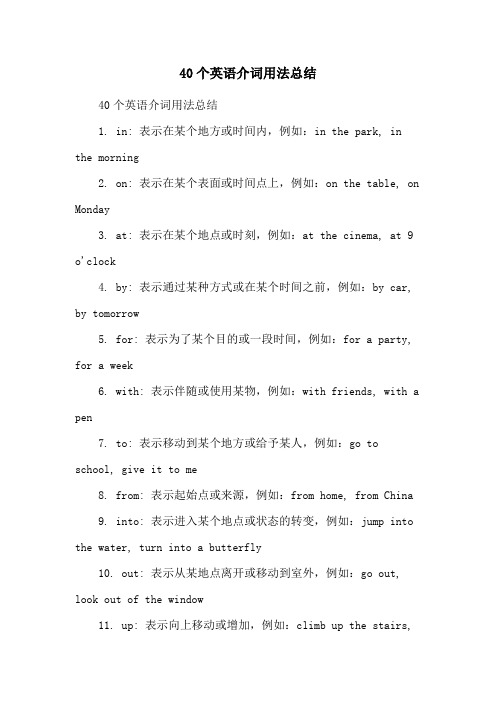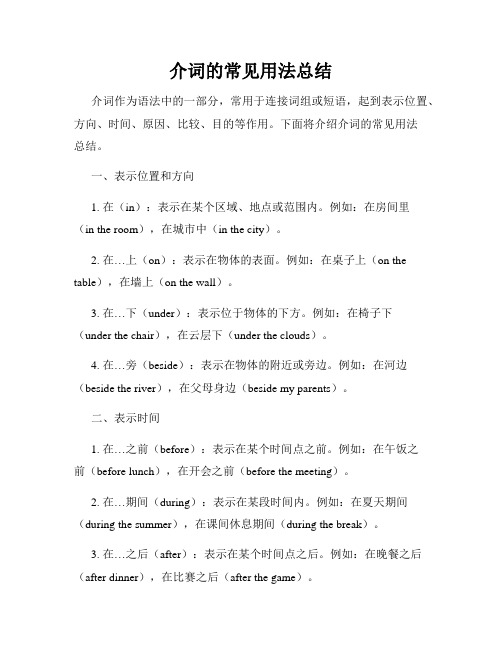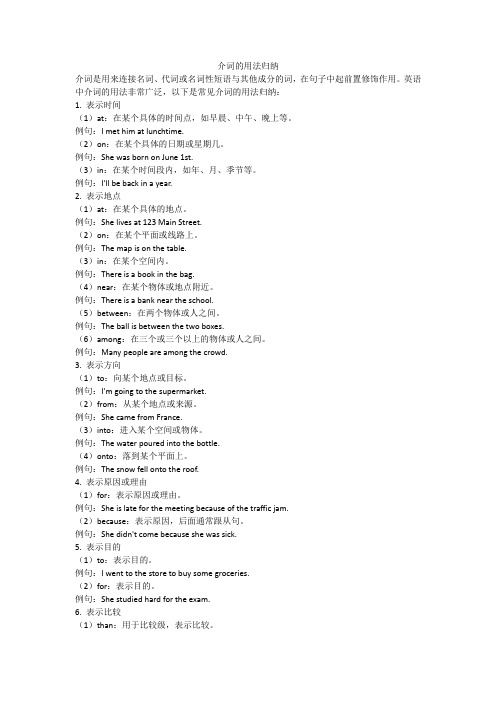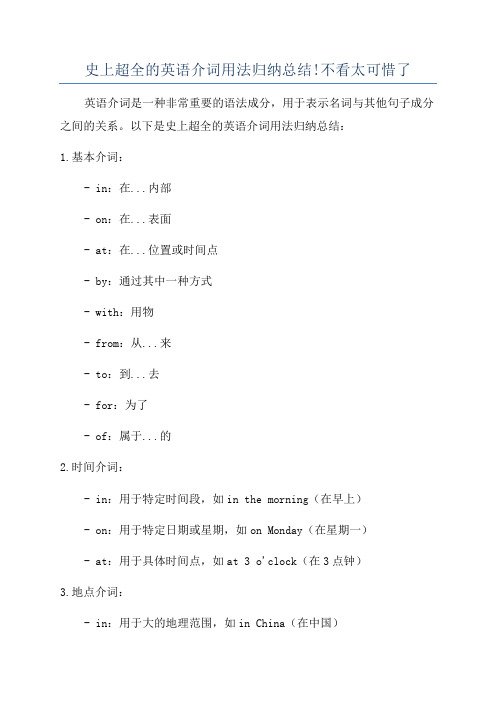常见介词用法
40个英语介词用法总结

40个英语介词用法总结40个英语介词用法总结1. in: 表示在某个地方或时间内,例如:in the park, in the morning2. on: 表示在某个表面或时间点上,例如:on the table, on Monday3. at: 表示在某个地点或时刻,例如:at the cinema, at 9 o'clock4. by: 表示通过某种方式或在某个时间之前,例如:by car, by tomorrow5. for: 表示为了某个目的或一段时间,例如:for a party, for a week6. with: 表示伴随或使用某物,例如:with friends, with a pen7. to: 表示移动到某个地方或给予某人,例如:go to school, give it to me8. from: 表示起始点或来源,例如:from home, from China9. into: 表示进入某个地点或状态的转变,例如:jump into the water, turn into a butterfly10. out: 表示从某地点离开或移动到室外,例如:go out, look out of the window11. up: 表示向上移动或增加,例如:climb up the stairs,wake up12. down: 表示向下移动或减少,例如:walk down the hill, calm down13. about: 表示关于某事或在某个范围内,例如:talk about the movie, wander about the city14. off: 表示离开或关闭,例如:get off the bus, turnoff the lights15. on: 表示打开或激活,例如:turn on the TV, switch on the computer16. over: 表示越过或在某地上方,例如:jump over the fence, fly over the city17. under: 表示在某物下面或被控制或影响,例如:hide under the bed, live under his rules18. with: 表示具有某种特征或和某人一起做某事,例如:a man with blue eyes, dance with me19. without: 表示没有某物或在缺乏某物的情况下,例如:go without food, live without regret20. by: 表示通过某种方式,例如:learn by doing, go by bus21. through: 表示穿过某物或完成某事,例如:walk through the door, go through the documents22. across: 表示横穿某物或在某个范围内,例如:swimacross the river, all across the world23. between: 表示在两个事物之间或在某个时间段,例如:choose between two options, between 9 and 10 o'clock24. among: 表示在三个或三个以上事物之间或在某群人中,例如:share among friends, discuss among colleagues25. around: 表示在周围或在某个时间点附近,例如:walk around the park, around midnight26. through: 表示通过某事物或在某段时间内,例如:read through the book, work through the night27. against: 表示反对或靠在某物上,例如:fight against injustice, lean against the wall28. for: 表示代表或支持某人或某事,例如:vote for a candidate, fight for freedom29. towards: 表示朝向某个方向或对某人有好感,例如:walk towards the beach, feel towards someone30. within: 表示在某个时间或范围内,例如:arrive within an hour, within the city limits31. beyond: 表示超出某个界限或超过某个程度,例如:beyond expectations, beyond the horizon32. along: 表示沿着某个路线或伴随某人一起,例如:walk along the street, sing along with the song33. above: 表示在某物之上或高于某个程度,例如:flyabove the clouds, above average34. below: 表示在某物之下或低于某个程度,例如:swim below the surface, below freezing35. beside: 表示在某物旁边或和某人一起,例如:sit beside me, beside the lake36. near: 表示在某物附近或接近某个时间,例如:live near the beach, near the end37. past: 表示经过某个地点或在某个时间之后,例如:walk past the store, past midnight38. around: 表示在周围或大约某个数量,例如:look around the room, around 20 people39. after: 表示在某个时间之后或追求某人或某事,例如:after dinner, run after the dog40. before: 表示在某个时间之前或在某个事件之前,例如:before sunrise, before the meeting这些介词是英语中常用的一些基本介词,它们在表达地点、时间、方式等方面起到了重要的作用。
介词的常见用法总结

介词的常见用法总结介词在英语语法中扮演着重要的角色,用于表达名词、动词或其他词类之间的关系。
在本篇文章中,将总结介词的常见用法并提供相关的例句,以帮助读者更好地理解和运用介词。
一、位置及方向1. 在……之上(on):The book is on the table.(书在桌子上。
)2. 在……之下(under):The cat is under the chair.(猫在椅子下面。
)3. 在……之间(between):The sandwich is between the two plates.(三明治在两个盘子之间。
)4. 在……旁边(beside):She is sitting beside her sister.(她坐在她妹妹旁边。
)5. 在……之内(inside):The keys are inside the drawer.(钥匙在抽屉里。
)6. 在……之外(outside):They are playing outside the house.(他们在屋外玩耍。
)7. 在……之间(among):The book is among the other books on the shelf.(这本书在书架上其他书之间。
)二、时间1. 在……之前(before):I have to finish my homework before dinner.(我必须在晚饭前完成作业。
)2. 在……期间(during):She met her friends during the summer vacation.(她在暑假期间见到了她的朋友们。
)3. 在……之后(after):We usually go for a walk after dinner.(我们通常在晚饭后散步。
)4. 在……时刻(at):The movie starts at 8 o'clock.(电影八点开始。
)5. 在……期望完成的时间(by):He needs to submit the report by tomorrow.(他需要在明天之前提交报告。
介词的常见用法及搭配

介词的常见用法及搭配介词在英语中起到连接词与词之间关系的作用,常用于表示时间、地点、原因、结果、方式等多种语境中。
本文将介绍介词的常见用法及其常见的搭配。
一、表示时间的介词:1. In:表示在某个特定的时间段或年代。
例:I will meet you in the evening.例:In the 1980s, disco music was popular.2. On:表示具体某一天或日期。
例:I have a meeting on Monday.例:We usually have a family dinner on Christmas Day.3. At:表示具体的时刻或某个特定时间点。
例:Let's meet at 9 o'clock.例:The concert starts at 7:30 pm.4. For:表示时间段的长度。
例:He has been living in Paris for five years.例:I will be on vacation for two weeks.二、表示地点的介词:1. In:表示在某个大范围的地点。
例:She lives in New York.例:They are studying in the library.2. On:表示在某个平面或具体的地点上。
例:The book is on the table.例:I saw her on the beach yesterday.3. At:表示在某个具体的地方或建筑物。
例:They are waiting at the bus stop.例:The party is at my house tonight.4. By:表示经过某个地点。
例:I go to work by bus every day.例:They traveled to the city by train.三、表示原因的介词:1. Because of:表示由于某个原因。
介词的常见用法总结

介词的常见用法总结介词作为语法中的一部分,常用于连接词组或短语,起到表示位置、方向、时间、原因、比较、目的等作用。
下面将介绍介词的常见用法总结。
一、表示位置和方向1. 在(in):表示在某个区域、地点或范围内。
例如:在房间里(in the room),在城市中(in the city)。
2. 在…上(on):表示在物体的表面。
例如:在桌子上(on the table),在墙上(on the wall)。
3. 在…下(under):表示位于物体的下方。
例如:在椅子下(under the chair),在云层下(under the clouds)。
4. 在…旁(beside):表示在物体的附近或旁边。
例如:在河边(beside the river),在父母身边(beside my parents)。
二、表示时间1. 在…之前(before):表示在某个时间点之前。
例如:在午饭之前(before lunch),在开会之前(before the meeting)。
2. 在…期间(during):表示在某段时间内。
例如:在夏天期间(during the summer),在课间休息期间(during the break)。
3. 在…之后(after):表示在某个时间点之后。
例如:在晚餐之后(after dinner),在比赛之后(after the game)。
三、表示原因1. 因为(because of):表示由于某个原因。
例如:因为天气原因(because of the weather),因为健康问题(because of health issues)。
2. 由于(due to):表示由于某种情况或原因。
例如:由于交通堵塞(due to traffic congestion),由于工作原因(due to work commitments)。
四、表示比较1. 像…一样(like):表示两个或多个事物在某些方面的相似性。
介词的用法归纳

介词的用法归纳介词是用来连接名词、代词或名词性短语与其他成分的词,在句子中起前置修饰作用。
英语中介词的用法非常广泛,以下是常见介词的用法归纳:1. 表示时间(1)at:在某个具体的时间点,如早晨、中午、晚上等。
例句:I met him at lunchtime.(2)on:在某个具体的日期或星期几。
例句:She was born on June 1st.(3)in:在某个时间段内,如年、月、季节等。
例句:I'll be back in a year.2. 表示地点(1)at:在某个具体的地点。
例句:She lives at 123 Main Street.(2)on:在某个平面或线路上。
例句:The map is on the table.(3)in:在某个空间内。
例句:There is a book in the bag.(4)near:在某个物体或地点附近。
例句:There is a bank near the school.(5)between:在两个物体或人之间。
例句:The ball is between the two boxes.(6)among:在三个或三个以上的物体或人之间。
例句:Many people are among the crowd.3. 表示方向(1)to:向某个地点或目标。
例句:I'm going to the supermarket.(2)from:从某个地点或来源。
例句:She came from France.(3)into:进入某个空间或物体。
例句:The water poured into the bottle.(4)onto:落到某个平面上。
例句:The snow fell onto the roof.4. 表示原因或理由(1)for:表示原因或理由。
例句:She is late for the meeting because of the traffic jam.(2)because:表示原因,后面通常跟从句。
史上超全的英语介词用法归纳总结!不看太可惜了

史上超全的英语介词用法归纳总结!不看太可惜了英语介词是一种非常重要的语法成分,用于表示名词与其他句子成分之间的关系。
以下是史上超全的英语介词用法归纳总结:1.基本介词:- in:在...内部- on:在...表面- at:在...位置或时间点- by:通过其中一种方式- with:用物- from:从...来- to:到...去- for:为了- of:属于...的2.时间介词:- in:用于特定时间段,如in the morning(在早上)- on:用于特定日期或星期,如on Monday(在星期一)- at:用于具体时间点,如at 3 o'clock(在3点钟)3.地点介词:- in:用于大的地理范围,如in China(在中国)- on:用于较小的地理范围或表面,如on the street(在街上)- at:用于具体地点,如at the supermarket(在超市)4.方向介词:- to:表示到达一些地方,如go to school(去学校)- into:表示进入一些地方,如go into the house(进入房子)- out of:表示离开一些地方,如get out of the car(离开车)5.原因介词:- because of:由于,如He is late because of the traffic(他因为交通堵塞而迟到)- due to:由于,如The flight was canceled due to bad weather(因为恶劣天气,航班被取消)6.动词短语介词:- look after:照顾,如She looks after her younger brother (她照顾她的弟弟)- take care of:照顾,如He takes care of his plants(他照顾他的植物)7.形容词短语介词:- interested in:对...感兴趣,如She is interested in music (她对音乐感兴趣)- good at:擅长...,如He is good at playing basketball(他擅长打篮球)8.其他常见介词用法:- with regard to:关于,如With regard to the matter, I have something to say(关于这件事,我有些话要说)- instead of:代替,如I will go instead of him(我将代替他去)- according to:根据,如According to the weather forecast, it will rain tomorrow(根据天气预报,明天会下雨)以上是一些常见的英语介词用法总结,希望能帮到你!。
40个介词用法总结

40个介词用法总结介词是英语中非常重要的一类词性,它在句子中起着连接词与词、短语与短语的作用。
介词的正确使用对于句子的表达和理解至关重要。
下面将介绍40个常见介词的用法总结,希望能够帮助大家更好地掌握介词的用法。
1. about。
介词about表示“关于”,用于询问或表达主题或内容。
例如,What are you talking about?(你在谈论什么?)。
2. above。
介词above表示“在……之上”,用于表示位置关系。
例如,The sun is above the clouds.(太阳在云层之上。
)。
3. across。
介词across表示“横过,穿过”,用于表示横跨某个区域或穿过某个物体。
例如,We walked across the bridge.(我们走过了桥。
)。
4. after。
介词after表示“在……之后”,用于表示时间先后关系。
例如,We'll go for a walk after dinner.(晚饭后我们会去散步。
)。
5. against。
介词against表示“靠着,依靠”,用于表示两个物体之间的接触或支撑关系。
例如,He leaned against the wall.(他靠在墙上。
)。
6. along。
介词along表示“沿着”,用于表示沿着某个方向或路线。
例如,We walked along the river.(我们沿着河边走。
)。
7. amid。
介词amid表示“在……之中”,用于表示某个场所或环境中。
例如,The children played happily amid the flowers.(孩子们在花丛中快乐地玩耍。
)。
8. among。
介词among表示“在……之中”,用于表示三个或三个以上的人或物之间的关系。
例如,She is among the top students in her class.(她是班里的尖子学生之一。
)。
9. around。
汉语常见介词

汉语常见介词一、表示时间的介词1. 在- 用法示例:- 在早上,我喜欢去公园跑步。
(表示某个具体的时间范围)- 他在春节期间回了老家。
(特定的节日期间)2. 于- 用法示例:- 会议于上午九点开始。
(比较正式的书面语中表示时间)- 这件事发生于上个世纪。
(表示过去的某个时间范围)3. 自- 用法示例:- 自即日起,公司实行新的规章制度。
(表示从某个时间点开始) - 他自去年就开始学习书法了。
(从过去某个时间起)二、表示地点、方位的介词1. 在- 书在桌子上。
(表示物体的位置)- 他在教室里学习。
(表示人所在的地点)2. 从- 用法示例:- 他从家里出发去学校。
(表示起点)- 小鸟从树林里飞出来。
(起点位置)3. 到- 用法示例:- 我到超市买东西。
(表示到达的地点) - 火车到北京了。
(到达目的地)4. 向- 用法示例:- 他向山上走去。
(表示方向)- 汽车向南方行驶。
(行驶的方向)5. 朝- 窗户朝东开。
(表示朝向)- 他朝图书馆的方向跑去。
(朝着某个方向)三、表示对象、范围的介词1. 对- 用法示例:- 老师对学生很关心。
(表示对象)- 他对这件事有不同的看法。
(针对某事的态度对象)2. 对于- 用法示例:- 对于这个问题,我们需要认真思考。
(引出对象,与“对”用法相似,多用于书面语)- 对于那些困难,我们要勇敢面对。
3. 关于- 用法示例:- 我读了一本关于历史的书。
(表示内容的范围)- 关于这次会议的安排,已经通知下去了。
(引出相关的事情范围)四、表示方式、手段的介词1. 用- 用法示例:- 我用钢笔写字。
(表示使用的工具)- 他用这种方法解决了问题。
(表示采用的方式)2. 以- 用法示例:- 他以优异的成绩考上了大学。
(表示凭借的条件)- 我们要以积极的态度对待生活。
(凭借某种态度方式)五、表示原因的介词1. 因为- 用法示例:- 因为下雨,所以地面湿了。
(引出原因)- 他因为生病没有来上学。
- 1、下载文档前请自行甄别文档内容的完整性,平台不提供额外的编辑、内容补充、找答案等附加服务。
- 2、"仅部分预览"的文档,不可在线预览部分如存在完整性等问题,可反馈申请退款(可完整预览的文档不适用该条件!)。
- 3、如文档侵犯您的权益,请联系客服反馈,我们会尽快为您处理(人工客服工作时间:9:00-18:30)。
常见介词的用法云南省巧家县第二中学(原巧家五中)潘华祥(654600)介词属虚词,不能单独使用, 必须和名词、代词或动名词构成介词短语,在句中做表语,定语、状语、补语等成分。
根据介词的用法,通常可以分为:时间、地点、趋向和其他四类介词。
一、表示时间的介词1)、时间三姐妹at, in, on.①at常用于“在几点几分”如:at 7:00am/pm及某些固定法如:at noon, at night中;②in 表“在某年、某月、某季节”及泛指“在上午/下午/晚上”如:in 2006, in summer,in the morning/afternoon/evening,③on 表“在某天及某天的上午/下午/晚上”如:on Sunday, on May 2nd, on Monday morning, on a warm morning, on the morning of July 1st 2)、时间的前后after, beforeEg. Don’t say that before you look at the picture.After four days, she came to a deep river.3)、时间的期限by, till/untilEg. By the time I arrived, she had already gone.I won’t be free till/until Saturday afternoon3)、时间的期限by, till, untilEg. By the time I arrived, she had already gone.I won’t be free till Saturday afternoon.4)、时间的期间for, duringEg. Florence often worked for twenty-four hours without rest.During the lifetime of one man, it often happens a lot of things.5)、时间的起点from, sinceEg.The workers was made to work from 7 in the morning to 7 in the evening.Since that time, my eyes had never been very good.6)、时间的经过in, withinEg. I heard that she would be back in a month.In this way, the message would be sent 500kms within a few hours.二、地点和方位的介词1、里面上面in和on, over, under上下方, at在某一地点上。
2、in front of前,behind后,in the middle of在中央。
3、between两者, among仨,around表示在四方。
4、来自from ,朝向to ,从中穿过用through ,表面跨过用across,沿着----走用along.5、到上面onto,进里面into ,在旁边用beside,在附近用near (by).三、表示手段和材料等的介词1)byEg. What do you mean by this word?I prefer traveling by train.2)with—withoutEg. There is a cup with three legs.You could cut it with a knife.I went shopping with my mother.She can’t finish her homework without the teacher’s help.四、其它介词。
1. with (1)在一起;(2)有;(3)用某种工具in 用什么材料或语言,或表示衣着,声调特点等by 用…手段2. like 象…一样as 作为;按照,象…一样(连词)+句子3.for(1)为了(表示目的或原因)(2)(后面加一段时间)表示时间段4. against 反对except,instead of5. about 关于6.动词+介词/副词”短语的区别•turn on/off/up/down; look at/for/after/over/up; put on/up/away/down;be used for/as/by; be made by/in/of/from例如:What’s this in English?The girl always talks _in_ a tired voice.The boy in a jacket is my brother.We are for peace(和平) against war.(战争)All the boys are here except Tom.介词用法口诀(一)早、午、晚要用i n,a t黎明、午夜、点与分。
年、月、年月、季节、周,阳光、灯、影、衣、冒i n。
将来时态i n...以后,小处a t大处i n。
注:①in the morning /afternoon /evening in the dayat dawn/daybreak(黎明) at noon at night at midnight②in 2006, in July, in summer③Don't read in dim(暗淡的)light. in the bright sunlightthe woman in white (black, red, yellow) in brown shoes④T h e y w i l l c o m e b a c k i n10d a y s.I'l l c o m e r o u n d i n a d a y o r t w o.W e’l l b e b a c k i n n o t i m e.C o m e a n d s e e m e i n t w o d a y s’t i m e.⑤ i n C h i n a i n B e i j i n g a t Q i a o j i a介词用法口诀(二)•i n …(从现在开始) a f t e r ... (从过去开始)有形w i t h 无形b y ,语言 、单位、材料i n ;特征、方面与方式、心情、成语惯用i n介词a t 、t o 表方向,攻击、位置、善、恶、分日子、日期、年月日,星期加上早午晚; 以下皆用o n•on the second of January 或 on January the second• on a summer evening• on New Year ‘s Day• on my birthday五、易混淆介词及词组归类1、in +段时间,与将来时连用,表过一段时间之后+段时间,与过去时连用,表过一段时间之后+点时间,与将来时连用,表多少时间之后Eg. He will be back after three o’clock.He will be back in a few minutes.He came back after three days.2. in the east of (内含)(根据数学中两圆关系的判断 )to the east of (相离)on the east of (外切)3 in the tree (表示树上不能生长的东西) on the tree (表示能在树上生长的东西)4. in the wall (在墙的内部) on the wall (在墙的表面)(看得出原材料)5. be made of (看不得出原材料)be made frombe made in 在哪里制造be made by 由什么人制造6.be used fo r 被用来做什么be used as 被当作什么来使用be used by 由什么人来用used to 过去常常做某事7.go on 继续go on doing sth / go on with sth 接着做相同的事go on to do sth 继续做不同的事after{ 由什么材料组成 }六、在下列情况下,时间状语前不用介词:1.当时间状语是today, tonight, yesterday, the day before yesterday, yesterdaymorning/afternoon/evening, tomorrow, tomorrow morning/afternoon/evening等时。
She went to the park yesterday.I’ll be free tomorrow morning.2.含有this, that, these, those, last, next, every, each等的时间状语不用介词。
We are going to play basketball this afternoon.I saw him in the street last Sunday.My mother gets up early every morning.We are working on the farm these days.3.以all开头的时间状语。
如:all day, all week, all year等前面不用介词。
He was busy all day yesterday.She was ill in bed all week.4.以some, any, one等构成的时间状语前不用介词。
You will feel sorry for it some day.You can come and ask me any time you like.This happened one winter morning.•注意:当one变成a时,往往就要用介词on。
•This happened on a winter’s morning.Exercise:Fill in the blanks with the right prepositions1)She was born _______the morning of April 22,1987.2)Is there a report about the bad weather _______ today’s newspaper?3)Go _______the bridge, you’ll find the museum on your left hand side.4)Say “please!” when you ask ______somebody.5)_______the time I arrived, the train had gone.6)We visited him at his workplace _________ the young trees.7)The artist has finished drawing the horse__________ five minutes.8)Sometimes Mary could hear planes _________the trees.9)Ma Lili argued ________ her best friend yesterday.10)There is a wide bridge ________ the river.11)Why would you like a girl instead________ a boy.12)After class ,I’ll say s omething ________our summer holiday.13)Look! She is standing ___________the tree.14)Miss Zhao hurried off to look _________ the man.15)Jane is behind Mary, Mary is _______________Jane.。
